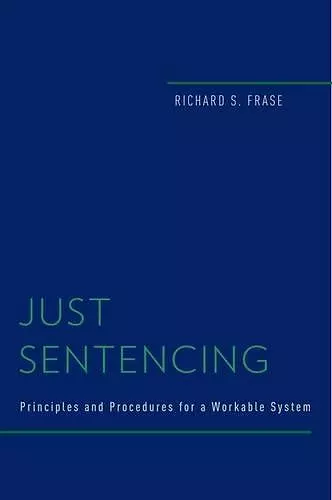Just Sentencing
Principles and Procedures for a Workable System
Format:Hardback
Publisher:Oxford University Press Inc
Published:17th Jan '13
Currently unavailable, and unfortunately no date known when it will be back

What are the most important purposes of punishment, in general and in particular cases? What makes just sentencing? These eternal questions are very difficult to answer because traditional as well as emerging sentencing purposes often conflict. Retributive and non-retributive institutions and intuitions of justice are both deeply-rooted and each equally hard to ignore. There is no generally accepted or well-elaborated theory to guide and evaluate recent or proposed sentencing changes, and most of the major books on sentencing theory are outdated. There is a compelling need for a new sentencing model. In Just Sentencing, Richard Frase describes and defends a hybrid sentencing model that integrates theory and practice--blending and balancing both the competing principles of retribution and rehabilitation and the procedural concern of weighing rules against discretion. Frase lays out a sentencing reform model based on the theory of limiting retributivism. The theory accommodates retributive values--especially the human-rights-based need to limit maximum sanction severity--along with crime-control goals such as deterrence, incapacitation, rehabilitation, and moral education. It also promotes efficiency and provides sufficient flexibility to incorporate victim and community participation, local values and resource limitations, and restorative justice programs. Frase presents his significantly expanded version of the limiting retributive model and distinguishes it from versions proposed by others. Next, he demonstrates the practical feasibility and widespread support for this approach by showing how it has been successfully implemented in Minnesota, while also identifying the less developed limiting retributive elements found in almost all Western countries. The final part of the book identifies and attempts to resolve the model's most important theoretical and practical challenges, and suggest further improvements. Just Sentencing is the first book in over forty years to present a fully developed punishment theory which incorporates both utilitarian and retributive sentencing purposes.
"Richard Frase's trailblazing Just Sentencing is the most ambitious and successful book yet written on sentencing reform in America. It authoritatively blends bodies of knowledge and experience - on normative theories of punishment, the effects of sentencing changes since 1975, and the operations of criminal courts - that are usually kept apart . If American policy makers want to create systems of sentencing that are better, fairer, and more just, Frase has shown them the way." --Michael Tonry, Professor in Law and Public Policy, University of Minnesota, and Senior Fellow, Netherlands Institute for the Study of Crime and Law Enforcement "What would a sensible sentencing structure look like in the second decade of the 21st century? How does one even think about such a question? How should one evaluate whether one has achieved all that can be achieved in structuring sentencing decisions? This book boldly addresses these and other questions, proposing a sentencing model that takes into account both what is known about sentencing, crime, and the criminal justice system while simultaneously considering what is likely to be acceptable to various groups. Whether or not one agrees with Richard Frase's conclusions to each of the difficult questions he addresses is, perhaps, less important than the incontrovertible fact that each of the areas he examines involves questions that cannot be avoided. This is a 'must read' book for anyone contemplating designing a rational and defensible structure for sentencing." --Anthony Doob, Professor of Criminology, University of Toronto "Richard Frase has for decades contributed immensely to the theory and practice of sentencing reform. Just Sentencing is his crowning achievement. The ambition of this project is enormous: Frase sets out to develop an intellectually cogent theory of criminal punishment and a set of procedures and rules for implementing that theory. What is truly remarkable is that he has been successful. Frase's proposals are theoretically, politically, and practically justified. Every jurisdiction seeking to balance public safety, public resources, respect for offenders and victims, and the social and other costs of mass incarceration should consider Frase's analysis and proposals." --Kate Stith, Lafayette S. Foster Professor of Law, Yale Law School "...This ambitious and complex model proposes a uniform approach to sentencing that would ameliorate the problems endemic to the current penal system... [Frase's] review of past theories and overview of existing models should prove useful to academics... Recommended." --CHOICE
ISBN: 9780199757862
Dimensions: 157mm x 236mm x 28mm
Weight: 522g
304 pages